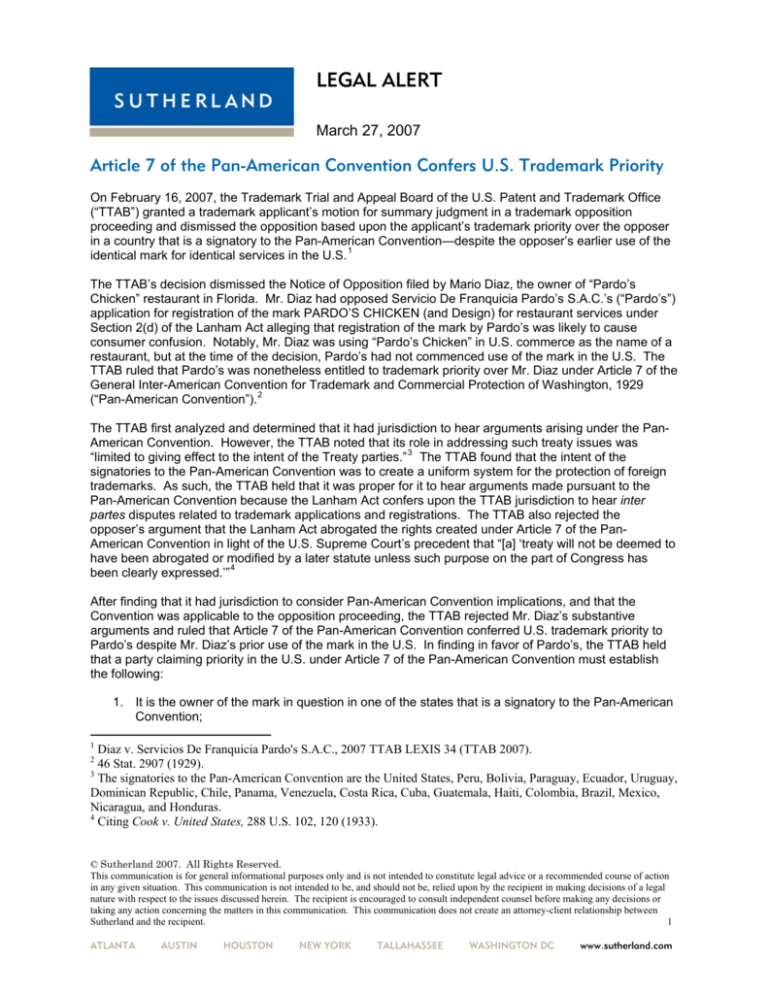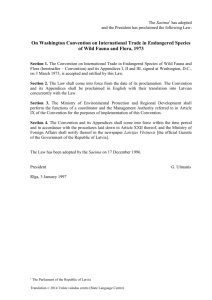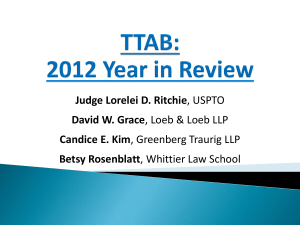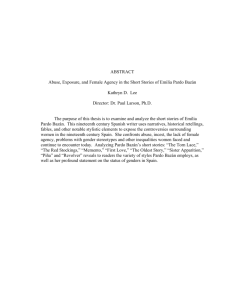
LEGAL ALERT
March 27, 2007
Article 7 of the Pan-American Convention Confers U.S. Trademark Priority
On February 16, 2007, the Trademark Trial and Appeal Board of the U.S. Patent and Trademark Office
(“TTAB”) granted a trademark applicant’s motion for summary judgment in a trademark opposition
proceeding and dismissed the opposition based upon the applicant’s trademark priority over the opposer
in a country that is a signatory to the Pan-American Convention—despite the opposer’s earlier use of the
identical mark for identical services in the U.S. 1
The TTAB’s decision dismissed the Notice of Opposition filed by Mario Diaz, the owner of “Pardo’s
Chicken” restaurant in Florida. Mr. Diaz had opposed Servicio De Franquicia Pardo’s S.A.C.’s (“Pardo’s”)
application for registration of the mark PARDO’S CHICKEN (and Design) for restaurant services under
Section 2(d) of the Lanham Act alleging that registration of the mark by Pardo’s was likely to cause
consumer confusion. Notably, Mr. Diaz was using “Pardo’s Chicken” in U.S. commerce as the name of a
restaurant, but at the time of the decision, Pardo’s had not commenced use of the mark in the U.S. The
TTAB ruled that Pardo’s was nonetheless entitled to trademark priority over Mr. Diaz under Article 7 of the
General Inter-American Convention for Trademark and Commercial Protection of Washington, 1929
(“Pan-American Convention”). 2
The TTAB first analyzed and determined that it had jurisdiction to hear arguments arising under the PanAmerican Convention. However, the TTAB noted that its role in addressing such treaty issues was
“limited to giving effect to the intent of the Treaty parties.” 3 The TTAB found that the intent of the
signatories to the Pan-American Convention was to create a uniform system for the protection of foreign
trademarks. As such, the TTAB held that it was proper for it to hear arguments made pursuant to the
Pan-American Convention because the Lanham Act confers upon the TTAB jurisdiction to hear inter
partes disputes related to trademark applications and registrations. The TTAB also rejected the
opposer’s argument that the Lanham Act abrogated the rights created under Article 7 of the PanAmerican Convention in light of the U.S. Supreme Court’s precedent that “[a] ‘treaty will not be deemed to
have been abrogated or modified by a later statute unless such purpose on the part of Congress has
been clearly expressed.’” 4
After finding that it had jurisdiction to consider Pan-American Convention implications, and that the
Convention was applicable to the opposition proceeding, the TTAB rejected Mr. Diaz’s substantive
arguments and ruled that Article 7 of the Pan-American Convention conferred U.S. trademark priority to
Pardo’s despite Mr. Diaz’s prior use of the mark in the U.S. In finding in favor of Pardo’s, the TTAB held
that a party claiming priority in the U.S. under Article 7 of the Pan-American Convention must establish
the following:
1. It is the owner of the mark in question in one of the states that is a signatory to the Pan-American
Convention;
1
Diaz v. Servicios De Franquicia Pardo's S.A.C., 2007 TTAB LEXIS 34 (TTAB 2007).
46 Stat. 2907 (1929).
3
The signatories to the Pan-American Convention are the United States, Peru, Bolivia, Paraguay, Ecuador, Uruguay,
Dominican Republic, Chile, Panama, Venezuela, Costa Rica, Cuba, Guatemala, Haiti, Colombia, Brazil, Mexico,
Nicaragua, and Honduras.
4
Citing Cook v. United States, 288 U.S. 102, 120 (1933).
2
© Sutherland 2007. All Rights Reserved.
This communication is for general informational purposes only and is not intended to constitute legal advice or a recommended course of action
in any given situation. This communication is not intended to be, and should not be, relied upon by the recipient in making decisions of a legal
nature with respect to the issues discussed herein. The recipient is encouraged to consult independent counsel before making any decisions or
taking any action concerning the matters in this communication. This communication does not create an attorney-client relationship between
Sutherland and the recipient.
1
ATLANTA
AUSTIN
HOUSTON
NEW YORK
TALLAHASSEE
WASHINGTON DC
www.sutherland.com
2. It “may have known” that the junior party is using or applying to register an “interfering mark” in
the U.S.;
3. The junior user of the mark had knowledge of the existence and continuous use of the mark in
one of the Convention signatory states prior to the junior user’s use of the mark in the U.S.; and
4. It has complied with the requirements of U.S. law and the Pan-American Convention.
In this case, Pardo’s produced evidence establishing (1) it was the owner of numerous relevant trademark
registrations in Peru, (2) it was aware of Mr. Diaz’s use of the mark and had objected to such use
following Mr. Diaz’s attempt to register the mark, (3) prior to opening the “Pardo’s Chicken” restaurant in
Florida Mr. Diaz had lived in Peru merely 20 blocks from a Pardo’s restaurant under the same
name/mark, and (4) by filing its application for registration of the mark in the U.S. it had complied with the
requirements of U.S. law and the Pan-American Convention.
This decision is notable in that it demonstrates that, under the terms of the Pan-American Convention,
there are certain limited circumstances under which a mark that has never been used in the U.S. may
nonetheless enjoy trademark priority over a mark that was used first in the U.S.
If you are interested in more information about these developments, please contact one of the following
attorneys in Sutherland’s intellectual property group.
Elisabeth A. Langworthy
James H. Johnson
David E. Weslow
Deidré A. Francis
202.383.0198
404.853.8395
202.383.0487
404.853.8131
elisabeth.langworthy@sablaw.com
james.johnson@sablaw.com
david.weslow@sablaw.com
deidre.francis@sablaw.com
© Sutherland 2007. All Rights Reserved.
This article is for informational purposes and is not intended to constitute legal advice.
ATLANTA
AUSTIN
HOUSTON
NEW YORK
TALLAHASSEE
2
WASHINGTON DC
www.sutherland.com







